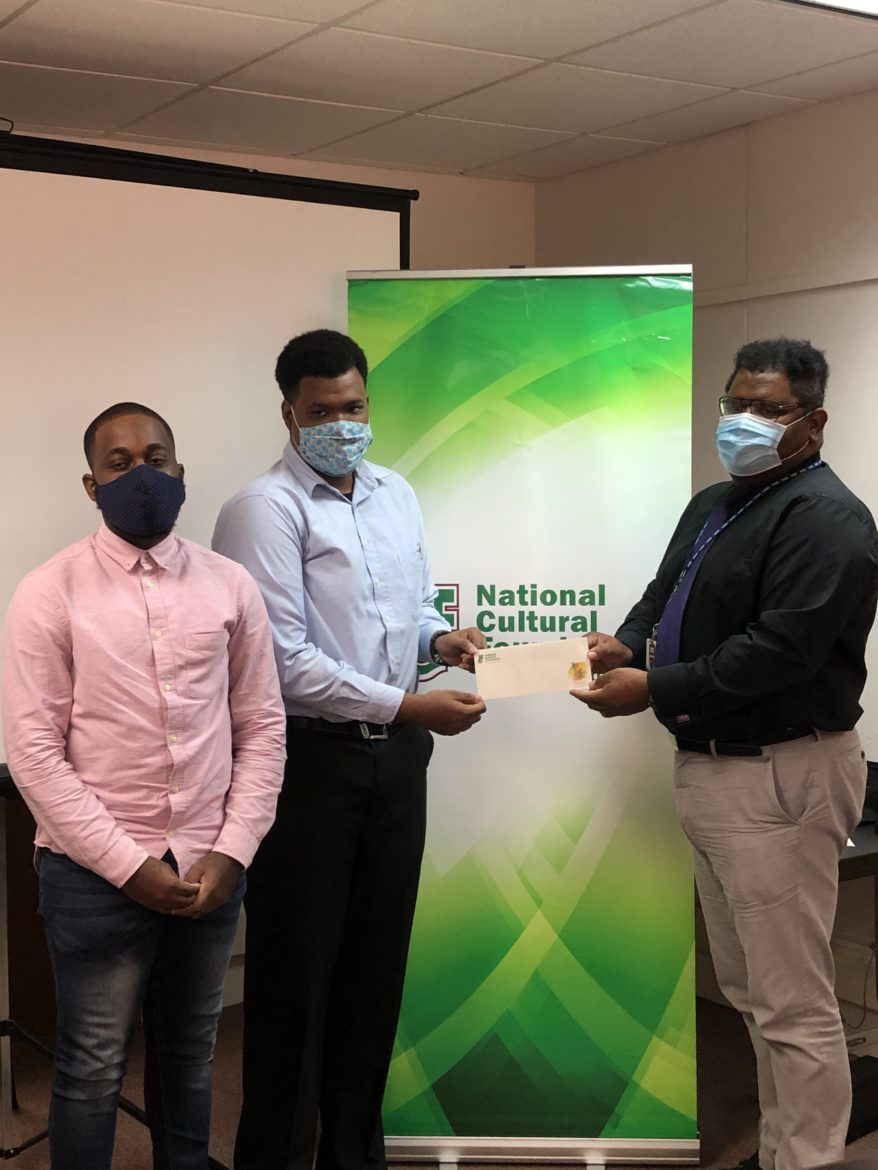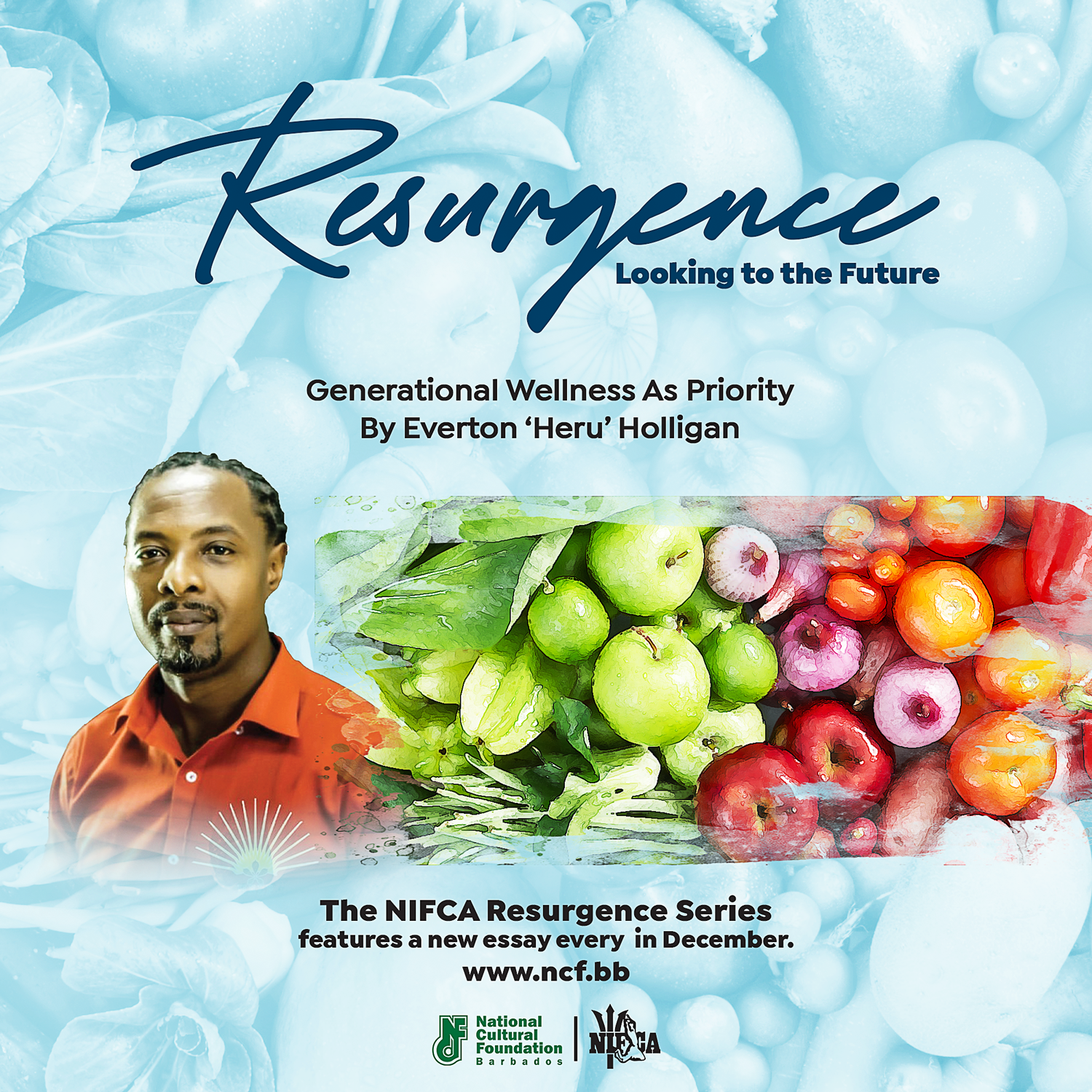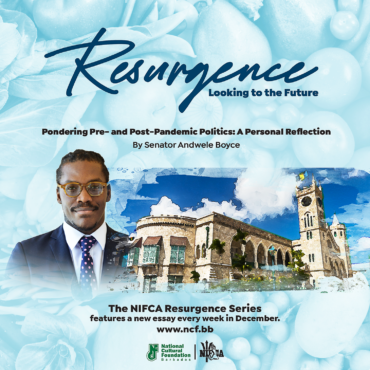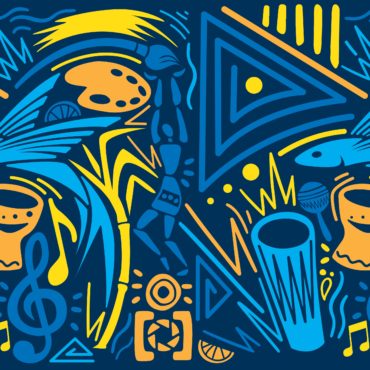
The National Cultural Foundation
West Terrace,
St. James, Barbados
246-417-6610

Arts & Culture - Literary ArtsNewsNIFCA
todayDecember 14, 2022 162

Resurgence: This series of essays curated by the National Cultural Foundation’s Literary Arts Officer, Karra Price, features the thoughts and commentaries of Barbadians immersed in various aspects of daily endeavour. This essay examines the impact of the pandemic on the health and wellness of our citizens. It considers the lessons learned, while compelling us to play an active role in our wellbeing.
By Everton ‘Heru’ Holligan
We have lived to tell the tale of COVID. We have witnessed the fear, the economic hardships, the public health initiatives and the loss of life.
Our world will never be the same. The experiences have been tragic. And, as a community, we must learn from these experiences. As we navigate through the ravages of the past two years, may we seek to preserve ourselves and begin the journey to wellness. May we make the sacrifices now to participate in healthy lifestyle activities. May we choose wisdom over fear, love over hate, and good healthy food over junk food, so we are better prepared to preserve our well-being.
The premature loss of life continues even when there is no pandemic. Thankfully, we in Barbados have a thriving, expert-driven community of medical professionals who save lives daily.
However, what we now know and have experienced is how opportunistic infectious diseases are, and how they expose the vulnerable in our communities to negative outcomes if infected. As quiet as it is kept, the annual flu season claims many of our immunocompromised citizens and those suffering from Non-Communicable Diseases (NCDs). As a developing nation, the impact of NCDs handicaps our progress. It traumatizes families, decimates institutions, and impacts our economy negatively. We must launch a meaningful strike, disarming NCDs, by empowering our citizens with knowledge and tools to help them accomplish wellness.
Wellness is more than just the absence of disease. Wellness is a state of being, that empowers citizens to have lifestyle practices that continuously improve their wellbeing and longevity, so they can prevent illness and live with minimal to no medical intervention.
This is a personal journey. Thankfully, we have an emerging awareness of healthy lifestyles practices and professional wellness practitioners who help our people keep this at the forefront of their day-to-day living. The pandemic has given rise to the public embrace of healthier choices.
This can be measured as one of the best outcomes from the COVID experience. However, we must not be complacent, but vigilant in expanding this wellness way of life to capture more of our citizens, especially the children. Let’s save our children.
Saving our next generation is a priority. Unfortunately, I don’t get the sense that our adult population understands how severely our youth are suffering from poor nutrition and unhealthy lifestyle habits. The trajectory is worrisome and requires immediate attention.
Poor nutrition, coupled with some loss of social skills and positive interactions due to the last two years of online learning, mask-wearing and social distancing, has left our children at a disadvantage and in need of specific interventions to help them recalibrate.
The combination of social skills disadvantages and ill health manifests in their inability to focus, low self-esteem, violent behaviors, and the unwillingness to master their experiences, among many other challenges. As a developing state, we need fearless youth who are driven to serve their families, communities, and nation, filled with passion and the desire to innovate and transform our world. This is a huge demand that requires a massive investment.
COVID has reinforced the need to move away from the norms, to help our children evolve on the track for excellence, to inspire their self-worth and confidence, to prepare them to face the world, unified in the diversity of problem solving, giving rise to the uninhibited search for truth and solutions.
COVID was a great divider. We saw censorship and division in family and community that was unprecedented. People were split in perspectives and opinions. Professionals were also at odds and confusion was destined to be the outcome.
Our wellness community was horrified at the proposals, saw the outcomes and kept quiet serving our customers behind closed doors for fear of victimisation. The division and confusion created among people are, thankfully, coming to an end, and I hope that the lessons were grasped, so this will never be repeated.
When there is fear and uncertainty cool heads must prevail. Empathy and patience with reasoning and temperament bring cohesion. Using might and arrogance isn’t the best approach in challenging times. Censorship created confusion and doubt, instead of silencing misinformation. Censorship gave rise to a sense of helplessness and hysteria.
In the future each of us must be allowed to take personal responsibility. No one institution or industry has a monopoly on your wellness. You are the best person to manage that responsibility. Don’t give up your power. It starts with what you think and how you think. Then what you eat and drink.
Your social network and your value systems. As we emerge from the horrors of imposed behaviors around the pandemic, these factors should be examined. As descendants of Africans the vast majority of our population including leaders and the educated professionals, must never forget that our people are vulnerable to the global powers, and that vulnerability should be properly managed by our own institutions, independently driven to service our needs to ensure our sense of personal sovereignty isn’t violated.
Emerging from the pandemic should trigger new ways of thinking to further seed our national identity and sovereignty. Good health and disease prevention can be a local product. We live on an island where healing can be found in the water that surrounds us, the fertile soil and in the wisdom of the elders.
We have to temper technology and science, with a knowledge base that is part of our historical cultural retentions. Nurturing healthy humans driven by passion and purpose to become masters of their own destiny and community is the mission. However, land redistribution must be a part of that journey.
Government support to prepare soil, secure quality seeds and train communities to advance a robust agricultural movement for the sake of healthy food security and options, while moving away from plantation mono-cropping, should be a passion-driven agenda, with timelines set to reach desired goals. If you grow your food, you will know what you are consuming.
Better environmental agricultural practices will be used, and healthier food options will be available for all. However, food grown for primarily commercial consumption, often have heavy pesticides and chemical fertilisers used which negatively affect the body when consumed. The long-term plans must begin now in cohesion with the short-term vision for wellness.
For the future, we hope wellness professionals get a seat at the table to share their ideas and experiences in dealing with illness. Wellness providers do a great job of keeping our state-run medical establishments from being overburdened. Gyms, alternative health care providers, herbal shops and natural foods spaces have a huge contribution to make in fighting disease, and should be recognised.
Public health policy should include all aspects of health and wellness approaches. How we treat to disease can impact our economy in a big way, so wellness providers are equally tasked with helping to reduce our medical spend.
Most of all we have to encourage continually a healthy sense of self and personal responsibility, therefore a new cultural narrative must be encouraged to help each of us feel a sense of purpose and pride, knowing we have a significant contribution to make to generations to come.
Written by: Info NCF

labelArts & Culture - Literary Arts todayDecember 8, 2022
This series of essays curated by the National Cultural Foundation’s Literary Arts Officer, Karra Price, features the thoughts and commentaries of Barbadians immersed in various aspects of daily endeavour. This [...]

labelNews todayFebruary 5, 2026

labelNews todayJanuary 28, 2026
The National Cultural Foundation
West Terrace,
St. James, Barbados
246-417-6610
Copyright 2024 National Cultural Foundation